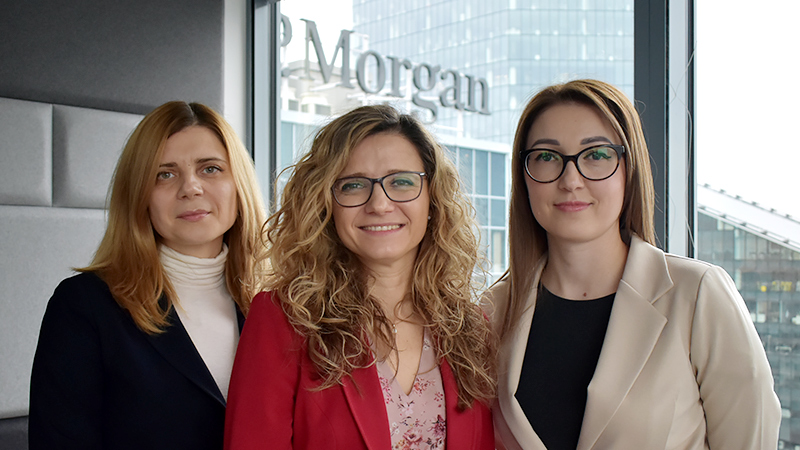While JPMorganChase's Warsaw staff wanted to help Ukraine's refugees, they knew they couldn’t do it alone. To develop the program, they collaborated with INCO, an international organization building opportunities for refugees and underserved communities. INCO had an existing relationship with JPMorganChase.
“When we connected with the corporate side in Warsaw, JPMorganChase's team knew they wanted to hire and train people, how many people that could be, and how much support those people would need. I was impressed,” recalls Van Anh Dam, director of INCO Academy International.
INCO provided JPMorganChase with insight into potential challenges, as well as direct support for the participants. This included resources to help them acclimate to life in a new city, peer-to-peer support sessions and team-building activities.
“Even if you know what refugees need, you need to know how to provide that support accessibly, how to make it efficient, scalable, and individualized,” Van Anh says.
INCO also provided assistance on the ground, helping JPMorganChase secure housing in Warsaw’s very competitive market, offering psychological support for warzone refugees, and finding schools for children. It also addressed more granular challenges, such as providing language translation and on-site personnel assistance.
A route to stability
For the first cohort, program managers chose 50 participants from approximately 2,000 applicants. For a full year, participants worked in the Warsaw offices while attending workshops, presentations, training courses, and peer-to-peer support forums, many of which were designed and conducted by JPMorganChase's staff.
At the program’s conclusion, participants had the opportunity to apply for full-time positions in the company. While those positions were open to all, the program helped the participants by providing professional development opportunities, which would be useful as they searched for other job opportunities at JPMorganChase.
Out of the first 50 participants, 44 secured full-time employment. Having completed her year in training, Lymar took a Corporate Controller position in Corporate Finance Team, which was the team she trained with. As for Paduchak, she is in the second cohort of 42 participants, and is considering full-time employment later this year.
A firmer foothold in poland
Despite the challenges of navigating a difficult, evolving situation, the Warsaw work and training program is a success, and it has had an outsized effect.
“We have these 92 people with a new foundation that changes everything in their lives,” Van Anh says. “Those we empower become role models and guides for other Ukrainians, including their children, parents, and others. This program has a ripple effect.”
Józwik acknowledges that, even though the participants want to stay at JPMorganChase, many of the refugees wish to return to Ukraine when the war is over. For now, however, the participants can only hope for the restoration of peace.
“We’re still very connected to Ukraine,” Lymar says. “But my kids know who helped them when they needed it. This program, for me, is light in a dark tunnel. I feel like I’ve started to live again.”
Calling the program “unique,” Van Anh says INCO has gathered learnings from it and shared them across other organizations. She believes the results of the Warsaw work and training program will aid INCO’s refugee support efforts in the future.
“I don’t know what life will be like in one year, but several months ago, I didn’t know what tomorrow would be like,” Paduchak says. “Now, I have a job and stability, and that’s been everything."





